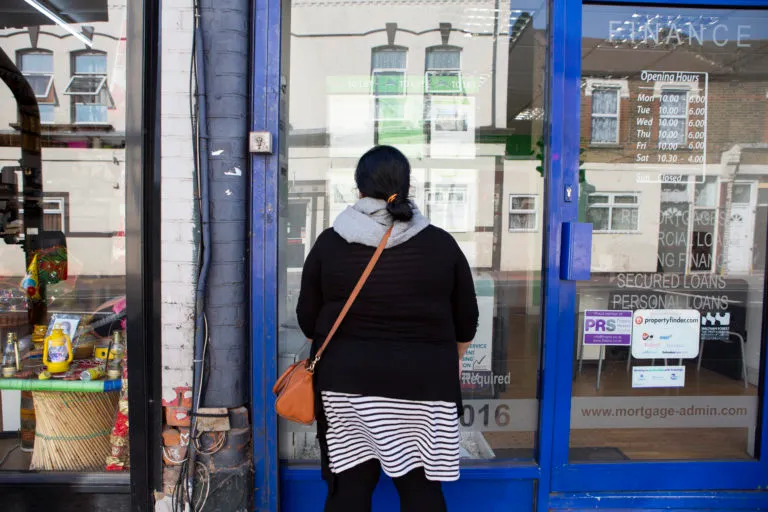DSS discrimination in the time of coronavirus
Published: by Maddy Moore

Discrimination against renters who receive housing benefit has long been preventing people from finding a safe home.
We’ve been speaking to thousands of renters about the challenges they’ve been facing during coronavirus. From the stories we’ve heard, we’re concerned that there will be a significant increase in housing benefit discrimination in the coming months – and this comes on top of the existing housing emergency, and the job losses, debt and insecurity that the pandemic is causing.
Housing benefit provides a life raft
We’re all feeling the impact of the coronavirus (COVID-19) pandemic on our daily lives. And for those already suffering from the inequalities in society, the effects are even greater.
It’s led to huge financial hardship, with thousands of people losing work and unable to cover their rent. This means many more are urgently in need of support, including housing benefit to help them pay their rent. Since March, over 1.5 million people have had to apply for Universal Credit.
All of us rely on publicly funded services and support systems, like education and our NHS. Benefits are another vital public service, and it’s right that people can access support such as housing benefit. Right now, it acts as a life raft to help people stay afloat when they’re struggling during COVID-19.
Since the pandemic began, we’ve been calling on the Government to increase the generosity of housing benefit to help more people cover their rent.
‘No DSS’, ‘no benefits’, ‘no Universal Credit’
But for many renters who receive housing benefit, they’re faced with discrimination when looking for a home. They’re being locked out of properties they could otherwise afford – simply because they receive housing benefit. Letting agents and landlords are putting in place so called ‘no DSS’, ‘no benefits’, or ‘no Universal Credit’ policies to prevent renters who receive housing benefit accessing homes.
This is discrimination, and it’s unlawful. It also has a direct and devastating impact on the lives of renters. It causes huge stress and anxiety, leads to people staying in unsuitable and unsafe accommodation because they can’t move – and ultimately, it can make people homeless.
A 2020 YouGov survey found that 63% of private landlords either operate an outright ban on letting to tenants receiving housing benefit or say they prefer not to let to this group.
Discrimination on the rise
Given the huge rise in the numbers of people receiving housing benefit and what we know about rates of discrimination, we’re concerned that there will be a significant increase in the numbers of people experiencing housing benefit discrimination in the coming months.
As people in existing tenancies tell their landlords they’ve applied for Universal Credit, and those who need to move home begin the search for somewhere to live, renters who are now relying on housing benefit to keep their head above water will be coming up against discrimination.
The likely spike in evictions in the months that follow the lifting of the evictions ban has the potential to exacerbate this further. When the ban is lifted, there will be an upsurge in the number of renters who need to look for a new home. A significant proportion of private renters who may be evicted will likely be receiving housing benefit, especially considering the huge rise in people applying for Universal Credit during the coronavirus outbreak, and so will be met by ‘no DSS’ policies.
In lockdown, but locked out
Already we’ve been hearing stories of renters coming up against housing benefit discrimination due to the coronavirus pandemic.
We’re speaking to renters whose landlords are refusing to accept their changeover to Universal Credit, and who’ve told them they need to start looking for somewhere else to live, and others who are having to hide the fact they’ve started receiving Universal Credit from their landlord.
We’ve heard from people who’ve been turned down for properties because they’re receiving Universal Credit and were left in limbo during lockdown, having to stay with friends or family. Others have told us they’re having to move to a new house while they should be shielding, and are struggling to find anywhere because of ‘no DSS’, ‘no benefits’ and ‘no Universal Credit’ policies.
Everyone needs a safe home during the crisis
Now more than ever, we need letting agents and landlords to treat all renters equally, and decide their suitability to rent a home based on whether they can afford the rent, not where their income comes from.
Everyone needs a safe place to call home during this crisis, and so we’ll be doubling up our efforts to end housing benefit discrimination for good.
Our guide for letting agents and landlords helps them comply with equality law and make sure they are not discriminating against people who receive benefits.